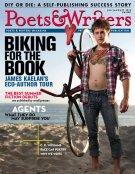The Rolex Mentor and Protégé Arts Initiative, which has facilitated relationships between writers and artists early in their careers and their more established counterparts since 2002, recently announced that this year’s mentor in literature, German writer Hans Magnus Enzensberger, has chosen as his protégée American poet Tracy K. Smith. The program encompasses six artistic disciplines: literature, dance, film, music, theater, and visual arts. This is the fifth year a mentorship has been awarded to a writer, and the first time the winning writer has hailed from the United States.
“There are so many different types of awards and modes of support for emerging writers,” says Smith, who has been the recipient of numerous honors, including a Wallace Stegner Fellowship and a Whiting Writers’ Award. “Most of them are primarily concerned with giving one the space, time, and finances to do the solitary work of writing. The Rolex Mentor and Protégé Arts Initiative provides for artists in a similar way, but it also creates an instant community of two that fosters a different kind of give-and-take."
Each protégé receives a grant of twenty-five thousand dollars, as well as money to cover travel and other major expenses. An additional twenty-five thousand dollars is available to each protégé after the mentorship year for the creation of a new piece of work. Each mentor receives an honorarium of fifty thousand dollars.
Smith and Enzensberger, who was named a mentor by an advisory board of fellow artists, will spend at least six weeks together, meeting in Enzensberger’s hometown of Munich and other locations to work on a literary project. Smith says one work-in-progress she may bring to Enzensberger—an eighty-year-old prizewinning poet, novelist, essayist, translator, and editor—is a novel she is currently writing. “It’s the kind of thing that, as a poet, I have only a vague idea of how to do,” says Smith. “My feeling so far is that it is like trying to build a house based on having visited houses in the past: There should be a kitchen, and a big open space where people can congregate, and plumbing, and lots of light. A mentor might be able to guide me on the mechanics, the technical aspects of what I am doing, and say things like, ‘I don’t think you want to put the stairs that close to the front door.’”
Since 2005 Smith has herself assumed the role of mentor to her students at Princeton University, where she teaches creative writing. The occasion to once again be approached from the other side, as a student, is something she anticipates with enthusiasm. “I love the opportunity to hone my own beliefs about writing, which teaching provides,” she says. “But it has been a long time since I’ve been able to engage in a sustained back-and-forth with a writer whose primary interest was to teach and guide me.”
The previous literature winners, chosen through an anonymous nomination process, are Julia Leigh of Australia, whose mentor was Toni Morrison; Antonio García Ángel of Colombia, whose mentor was Mario Vargas Llosa; Edem Awumey of the Togolese Republic, whose mentor was Tahar Ben Jelloun; and Tara June Winch of Australia, whose mentor was Wole Soyinka.
Alex DImitrov is the awards coordinator of the Academy of American Poets. He is also the founder of Wilde Boys, a queer poetry salon in New York City.








